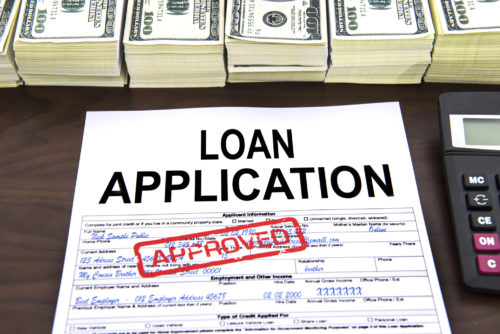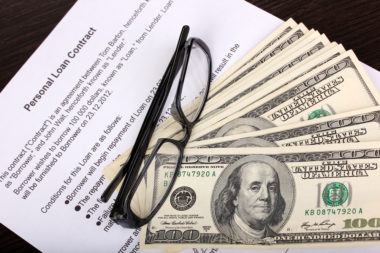Banks are trustworthy financial institutions — especially when it comes to the intimidating business of borrowing money. A good bank will have a solid track record and established processes and safeguards in place.
This guide is designed to take you through the process of applying for a loan from a bank. It will help you understand what to expect and will give you the best chance of success.
Table of Contents
Steps To Get A Loan
Unfortunately, applying for a loan from a bank isn’t quite as simple as signing up for a streaming subscription or reordering your favorite shampoo on Amazon.
You’re going to want to find a good loan calculator and then spend some time messing around with it in order to get a rough idea of what kind of loan you can afford.
In addition to that, a bank will need to see several intimate details about yourself and the state of your finances. You’re going to want to take some time to prepare for this before you ever set foot in a bank.
Check Your Credit
One of the first things that a bank will do is check your credit score. This is because a credit score is an excellent indicator of how you’ve handled borrowed funds in the past. A good credit score requires healthy financial habits over a long period of time. Viewing your score gives a bank a quick and easy indicator regarding your eligibility for a loan.
It’s always wise to check your credit score before you apply for a loan. You don’t necessarily need to request a hard credit check. A soft credit check should be fine, and it won’t impact your score. You can do this in multiple ways:
- Check with your credit card company. They can tell you your credit score based on a monthly soft inquiry they conduct.
- Use a financial institution like Experian, TransUnion, or Equifax to check your score.
A good credit score (based on the FICO credit scoring model) typically ranges between 670 and 799. While you can apply for a loan at a bank with a less-than-desirable score, you may not be approved. Even if you are approved, you’ll likely end up stuck with a higher interest rate.
If you feel your score may hurt your chances, here are a few ways to increase your score before applying for a loan.
- Pay down your balances on credit cards.
- Open up a new account to improve your credit utilization ratio — typically you don’t want to be using more than 30% of your available credit.
- Try to maintain a mixture of different credit accounts, such as a car loan, credit card, and mortgage.
- Always make your payments on time and avoid late fees and penalties.
Once your credit score is in a good place, you can begin researching the kind of loan you want to apply for.
Research Different Loans
There are several different kinds of loans that you can apply for at a bank. Each one has its own pros and cons that make them particularly suited to different situations. Make sure to go over the different loan types before you go to a bank so that you know which one is the best option for you.
Typical bank loan types include:
- Unsecured personal loans. These are loans that are not backed by a form of collateral, such as your car or your house. Consequently, they often have higher interest rates.
- Secured personal loans. This is a loan that is backed by a form of collateral,such as a savings account. They often come with lower interest rates.
- Lines of credit. These can be both secured and unsecured and provide you with a source of money to draw on when needed — although you’ll pay interest on the borrowed money. A Home Equity Line of Credit (HELOC) is a common example of a secured line of credit.
- Debt consolidation loans. These are aimed at bringing all of your outstanding debt into a single loan. While fairly easy to be approved for, they do come with higher interest rates.
- Fixed-rate loans. As the name implies, a fixed-rate loan comes with a fixed interest rate that, while often on the higher end of things, can be counted on to remain steady.
- Variable-interest loans. Opposite fixed-rate loans, there are variable interest loans. While they may have lower interest rates at the beginning, the rate can fluctuate over time. This is most commonly found with open lines of credit.
Knowing what type of loan you’re looking for can help to streamline the application process.
Shop Around
While you may have a bank that you prefer, it’s always wise to shop around before settling on a lender. If you have a good credit score, you should be able to apply for a loan at most banks, and it’s worth doing so in order to gauge your options.
The defining factor will be who offers you the best rates, although other perks can factor into the equation as well.
For instance, if you’re already a member of a credit union or an account-holder at a bank, the institution may offer to make the process easier for you based on your history as a customer. Members and account-holders can often receive benefits, such as paying lower origination fees, and may not need to physically visit a bank in order to apply for a loan.
If you shop at a variety of banks, make sure to do so within a short period of time, typically within 45 days of when your latest FICO score is checked. Many banks will do a hard credit check when considering your application, and if the credit checks are all done within a short period of time, they’ll typically be counted as a single inquiry.
Gather Necessary Documents
When you apply for a loan, you’re going to need to provide the necessary documentation. This will vary from one bank to the next, but common required paperwork includes:
- A valid form of ID.
- Your address.
- Your contact information.
- Why you’re taking out a loan.
- Proof of residence.
- Proof of employment.
- Your latest pay stub (or more than one).
Consider a Cosigner
If you feel you may not be approved, consider finding a cosigner. This is a person who’s willing to sign on to the loan along with you. This is a risk to the cosigner, so make sure that you find someone that you’re on good terms with and you trust. It’s very easy to take advantage of a cosigner, so care should be exercised whenever this option is considered.
Bank Loan Requirements
There’s a great deal of security and peace of mind that comes with getting a loan from a bank. This is largely due to the fact that banks can be particularly cautious when they approve a borrower.
It’s important to remember that banks are often cautious about lending money and will certainly do their due diligence in vetting a potential borrower before they allow them to get a loan. Factors like your credit score, income, and available assets (as well as those of a potential cosigner) can all be major deciding factors regarding whether or not you’re approved.
How Long Does it Take to Get a Loan?
While the specific amount of time it takes to get approved can vary depending on each bank and their vetting process, it typically takes around one week to process a loan application. During this time you can consider how you’d like to set up your payments and go over your personal budget to make sure you’re ready for the added expense.
Once you’re approved, you’ll typically see your funds within the next few business days, at which point you can set up your first payment.
Image Source: https://depositphotos.com/





